
The 26th annual Conference on Retroviruses and Opportunistic Infections (CROI) was held March 4-7, 2019 at the Washington State Convention Center in Seattle. HPTN researchers presented abstracts covering HPTN 071, 074, 077, 078, and 082.
Dr. Richard Hayes, HPTN 071 protocol chair, discussed primary results at a press conference and during an oral session, Impact of Universal Testing and Treatment in Zambia and South Africa: HPTN 071 (PopART). Findings from the study show delivery of an HIV prevention strategy that includes offering in-home HIV testing to everyone, with immediate referral to HIV care, and treatment for people living with HIV based on prevailing in-country guidelines, can substantially reduce new HIV infections. Also, from the HPTN 071 protocol team, Dr. Mohammed Limbada led the antiretroviral therapy delivery-themed discussion, Treat All, Treat Fast. Dr. Raphael Landovitz, HPTN 077 and HPTN 083 protocol chair, delivered an oral presentation, Cabotegravir is Not Associated with Weight Gain in HIV-Negative Individuals: HPTN 077 and Dr. James Moore discussed Estimating HIV Incidence Among Young Women in HPTN 082 Using Baseline HIV Risk Scores.

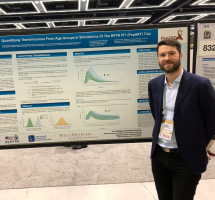 In addition to the dissemination of primary results, the HPTN 071 study team presented two posters. Dr. William Probert’s Quantifying Transmissions from Age Groups in Simulations of HPTN 071 (PopART) Trial illustrated the significant contribution of 25-34-year-old men to HIV transmission in generalized HIV epidemics in sub-Saharan Africa, and of young people when considering indirect transmissions.
In addition to the dissemination of primary results, the HPTN 071 study team presented two posters. Dr. William Probert’s Quantifying Transmissions from Age Groups in Simulations of HPTN 071 (PopART) Trial illustrated the significant contribution of 25-34-year-old men to HIV transmission in generalized HIV epidemics in sub-Saharan Africa, and of young people when considering indirect transmissions.
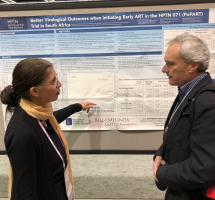 Dr. Sue-Anne Meehan’s Better Virological Outcomes When Initiating Early ART in the HPTN 071 (PopART) Trial showed participants in this study initiating ART with CD4 count ≥500 cells/µL had much better virological outcomes than those with a baseline CD4 count. (L-R, Drs. Sue-Ann Meehan and Tim Mastro)
Dr. Sue-Anne Meehan’s Better Virological Outcomes When Initiating Early ART in the HPTN 071 (PopART) Trial showed participants in this study initiating ART with CD4 count ≥500 cells/µL had much better virological outcomes than those with a baseline CD4 count. (L-R, Drs. Sue-Ann Meehan and Tim Mastro)
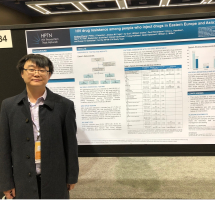 HPTN 074, a study among people living with HIV who inject drugs and their injection partners in Ukraine, Indonesia, and Vietnam was represented with two posters. Dr. Yinfeng Zhang’s HIV Drug Resistance Among PWID in Eastern Europe and Asia, HPTN 074 demonstrated the prevalence of drug resistance was significantly higher among those with ARV drugs detected than in those with no ARV drugs detected. Drug resistance was also detected more frequently among participants in Indonesia compared to Ukraine or Vietnam, and among participants who reported a history of incarceration compared to those who did not.
HPTN 074, a study among people living with HIV who inject drugs and their injection partners in Ukraine, Indonesia, and Vietnam was represented with two posters. Dr. Yinfeng Zhang’s HIV Drug Resistance Among PWID in Eastern Europe and Asia, HPTN 074 demonstrated the prevalence of drug resistance was significantly higher among those with ARV drugs detected than in those with no ARV drugs detected. Drug resistance was also detected more frequently among participants in Indonesia compared to Ukraine or Vietnam, and among participants who reported a history of incarceration compared to those who did not.
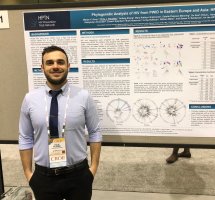 And Philip Palumbo’s poster Phylogenetic Analysis of HIV From PWID in Eastern Europe and Asia: HPTN 074 suggested there are complex patterns of HIV transmission among PWID in these communities, which should be considered when designing interventions for HIV prevention.
And Philip Palumbo’s poster Phylogenetic Analysis of HIV From PWID in Eastern Europe and Asia: HPTN 074 suggested there are complex patterns of HIV transmission among PWID in these communities, which should be considered when designing interventions for HIV prevention.
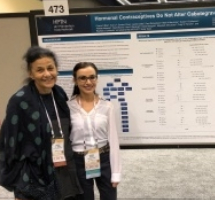 Long-acting injectable cabotegravir (CAB LA) was discussed in Dr. Cherie’s Blair’s presentation Hormonal Contraceptives Do Not Alter Cabotegravir PK in HIV-Uninfected Women HPTN 077. Her poster showed the effects of CAB LA on hormonal treatment for both contraception and gender-affirming treatment warrant evaluation. (L-R, Drs. Wafaa El-Sadr and Cherie Blair)
Long-acting injectable cabotegravir (CAB LA) was discussed in Dr. Cherie’s Blair’s presentation Hormonal Contraceptives Do Not Alter Cabotegravir PK in HIV-Uninfected Women HPTN 077. Her poster showed the effects of CAB LA on hormonal treatment for both contraception and gender-affirming treatment warrant evaluation. (L-R, Drs. Wafaa El-Sadr and Cherie Blair)
Dr. Ris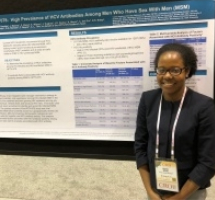 ha Irvin’s presentation HPTN 078: High Prevalence of HCV Antibodies Among Men Who Have Sex with Men raised concern that in HIV burden networks, high hepatitis C virus (HCV) infection prevalence may occur in HIV-uninfected MSM. HCV transmission risk could increase as PrEP implementation expands and condom use declines among HCV positive MSM.
ha Irvin’s presentation HPTN 078: High Prevalence of HCV Antibodies Among Men Who Have Sex with Men raised concern that in HIV burden networks, high hepatitis C virus (HCV) infection prevalence may occur in HIV-uninfected MSM. HCV transmission risk could increase as PrEP implementation expands and condom use declines among HCV positive MSM.
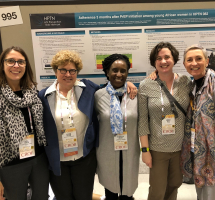 Dr. Connie Celum, HPTN 082 protocol chair, presented Adherence 3 Months After PrEP Initiation Among Young African Women in HPTN 082. Her poster showed additional adherence support may be useful for young African women who are uncertain about their partner's behavior and less sure about using PrEP. (L-R, Dr. Sybil Hosek, Dr. Connie Celum, Dr. Nyaradzo Mgodi, Bonnie Dye, Dr. Linda-Gail Bekker)
Dr. Connie Celum, HPTN 082 protocol chair, presented Adherence 3 Months After PrEP Initiation Among Young African Women in HPTN 082. Her poster showed additional adherence support may be useful for young African women who are uncertain about their partner's behavior and less sure about using PrEP. (L-R, Dr. Sybil Hosek, Dr. Connie Celum, Dr. Nyaradzo Mgodi, Bonnie Dye, Dr. Linda-Gail Bekker)
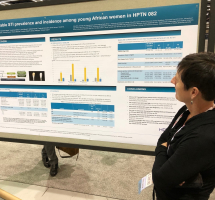 In addition, Dr. Sinead Delany-Moretlwe, HPTN 082 and HPTN 084 protocol co-chair presented High Curable STI Prevalence and Incidence Among Young African Women in HPTN 082. Her poster underscored the limitations of syndromic case management to control sexually transmitted infections in women particularly vulnerable to HIV infection, and the need for more sensitive diagnostic approaches.
In addition, Dr. Sinead Delany-Moretlwe, HPTN 082 and HPTN 084 protocol co-chair presented High Curable STI Prevalence and Incidence Among Young African Women in HPTN 082. Her poster underscored the limitations of syndromic case management to control sexually transmitted infections in women particularly vulnerable to HIV infection, and the need for more sensitive diagnostic approaches.
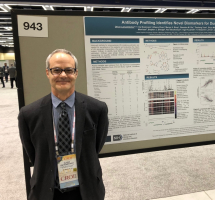
The HPTN Laboratory Center (LC) showcased its ongoing work with eight posters; three from Dr. Oliver Laeyendecker. An Early Decline in HIV Antibody Breadth Predicts More Rapid Disease Progression showed deep profiling of the antibody response to HIV infection identified a novel feature of the anti-HIV immune response, antibody breadth, that was associated with clinically-significant outcomes. Data from Complex Phylodynamics of HCV Among PWID Impact Inference of Transmission Networks suggested HCV transmission events are likely underestimated in most phylodynamic models. Antibody Profiling Identifies Novel Biomarkers for Duration of HIV Infection revealed deep profiling of the antibody response to HIV infection identified novel peptide biomarkers for the duration of HIV infection.
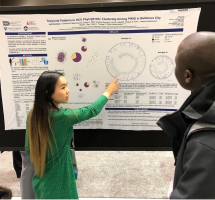 Jada Hackman’s poster Temporal Patterns in HCV Phylogenetic Clustering Among PWID in Baltimore, Maryland noted greater cluster diversity in the participants recruited in 2005-16 indicative of a less connected network of individuals sharing transmission risk, though major viral strains did persist over time in this cohort.
Jada Hackman’s poster Temporal Patterns in HCV Phylogenetic Clustering Among PWID in Baltimore, Maryland noted greater cluster diversity in the participants recruited in 2005-16 indicative of a less connected network of individuals sharing transmission risk, though major viral strains did persist over time in this cohort.
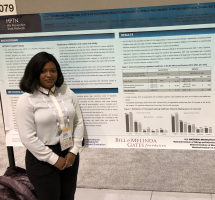 Sarah Kanema’s Health Care Utilization and Costs of Accessing Health Care in South Africa and Zambia reported the odds of accessing healthcare was higher for people living with HIV and diagnosed with TB, suggesting financial burden for people with chronic diseases.
Sarah Kanema’s Health Care Utilization and Costs of Accessing Health Care in South Africa and Zambia reported the odds of accessing healthcare was higher for people living with HIV and diagnosed with TB, suggesting financial burden for people with chronic diseases.
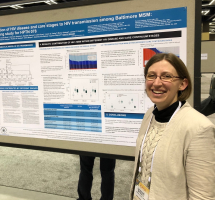 Dr. Catherine Mitchell’s Contribution of HIV Disease and Care Stages to HIV Transmission Among Baltimore MSM demonstrated increases in the relative contribution to transmission of diagnosed MSM reflect improvements in HIV testing, but the majority of these transmissions arise from those who remain untreated, showing gaps in treatment provision and retention.
Dr. Catherine Mitchell’s Contribution of HIV Disease and Care Stages to HIV Transmission Among Baltimore MSM demonstrated increases in the relative contribution to transmission of diagnosed MSM reflect improvements in HIV testing, but the majority of these transmissions arise from those who remain untreated, showing gaps in treatment provision and retention.
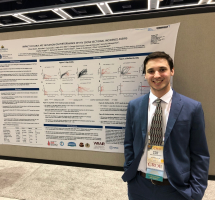 Ethan Klock’s Impact of Early ART Initiation on Performance of Cross-Sectional Incidence Assays revealed individuals who started ART one to three years after infection had a significantly faster decline in LAg-Avidity values than those who started ART approximately 10 years after infection.
Ethan Klock’s Impact of Early ART Initiation on Performance of Cross-Sectional Incidence Assays revealed individuals who started ART one to three years after infection had a significantly faster decline in LAg-Avidity values than those who started ART approximately 10 years after infection.
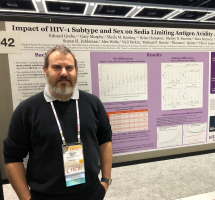 And Dr. Eduard Grebe’s Impact of HIV-1 Subtype and Sex on Sedia Limiting Antigen Avidity Assay Performance showed a mean duration of recent infections and false recent ration varied substantially by HIV-1 subtype and sex.
And Dr. Eduard Grebe’s Impact of HIV-1 Subtype and Sex on Sedia Limiting Antigen Avidity Assay Performance showed a mean duration of recent infections and false recent ration varied substantially by HIV-1 subtype and sex.